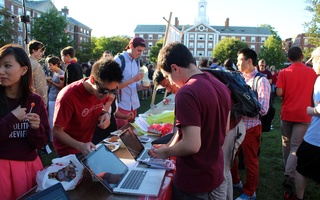Pointing out that the days of playing pick-up baseball after school are long gone, officials from the Cambridge City Council and the Cambridge Schools Committee discussed ways to enrich Cantabrigian students’ extracurricular lives at the Council’s weekly meeting Monday night.
At the round table meeting, officials stressed the need to expand student participation in so-called “out-of-school-time programs”—extracurricular activities occurring afterschool and over breaks.
“There should be no kid that goes home and plays Nintendo,” said Councillor Leland Cheung. “There’s no need to go home before five, six o’ clock.”
Many officials said they were concerned that the cost of extracurricular activities was discouraging students from participating and suggested creating scholarships for programs with hefty pricetags.
“Sometimes, children see the price column and shut down,” said Susan Richards, coordinator of out-of-school-time activities for the city of Cambridge. “Let’s take away the price column.”
Councillor Kenneth E. Reeves ’72 asked officials to concentrate not only on increasing the number of afterschool programs in Cambridge but also on improving the quality of those programs that already exist. He noted the absence of extracurricular activities in the fields of science, technology, engineering, and mathematics.
“We need to focus on things that will give us outcomes,” said Reeves. “I just don’t think that cheerleading and football are what we’re looking for in terms of outcome.”
On Monday a task force of school administrators and educators called the Out-of-School-Time Design Team presented their proposals for increasing extra-curricular participation. One program that the task force will pilot this year involves creating online “out-of-school-time passports” for middle-schoolers. Teachers and coaches from participating extracurricular programs would modify these passports, awarding their students “stamps” for significant participation and “badges” for improvement.
“We want the OST passport to grow within the upper school culture,” said Richards. “We hope that it will be something the students will want show-off.”
In an effort to raise awareness about opportunities that already exist, the Design Team recently compiled a booklet of out-of-school-time programs.
“Education happens beyond the framework of the school day,” said Cambridge Public Schools Superintendent Jeffrey M. Young at the start of the meeting. “We are really committed to providing those enriching opportunities to students.”
—Staff writer Sonali Y. Salgado can be reached at ssalgado@college.harvard.edu. Follow her on Twitter @sonalisalgado16.
Read more in News
UC Discusses New Website, Study Break FundingRecommended Articles
-
Hurry Now! Memories End Soon!There is no reason even to conform to the senior class's vision of special activities, because we can create our own memories, which can be more special than just another drink from the party punch.
-
Students, Administrators Talk StressAdministrators and students explored whether extracurricular activities induce excessive stress and whether the transition to sophomore year can be eased at a Committee on Student Life meeting yesterday morning.
-
Insistence on InvolvementCollege may be the only time that students can acquire and hone these skills without being expected to demonstrate them immediately—although the choice is left to them, we encourage students to take advantage of this time and of the academic gains that Harvard has to offer.
-
 The Extra-Curriculum
The Extra-Curriculum -
The College Outside the ClassroomJust because a skill cannot be taught in a lab or lecture does not mean it is not worth learning.
-
Harvard Neglects Humanities at Own PerilExtracurricular activities, arts, the humanities, and other related fields offer more than a diversity of opportunity on Harvard’s campus. They provide a wealth of new ideas and ways of thinking that make the community interesting and vibrant.













